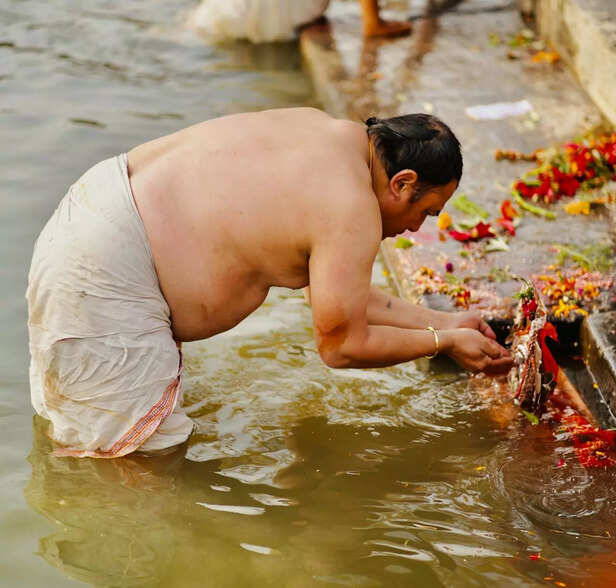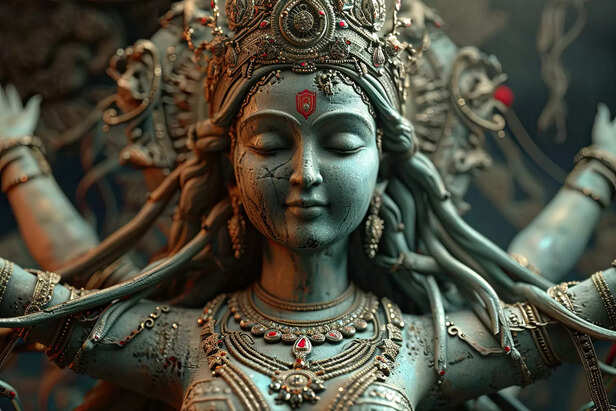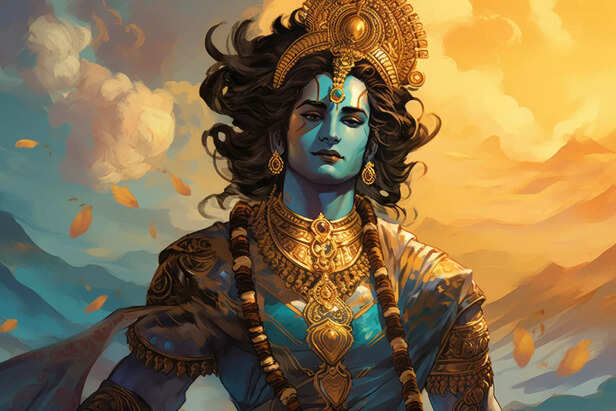Why Millions Fast on Ekadashi: A Sacred Tradition Rooted in Divine Forgiveness and Spiritual Liberation
Ushnish Samadder | Freepik | May 29, 2025, 11:01 IST
( Image credit : Freepik, Timeslife )
“Why Millions Fast on Ekadashi: A Sacred Tradition Rooted in Divine Forgiveness” explores the mythological and spiritual origins of Ekadashi, a revered fasting day in Hinduism. The article recounts the divine story of Ekadashi Devi, born from Lord Vishnu to defeat evil, and explains how fasting on this day grants forgiveness, purifies karma, and leads to spiritual liberation. It also highlights the physical, mental, and cosmic significance of Ekadashi, showing how this ancient practice remains profoundly relevant in the modern world.
The story begins in a time when evil forces were growing stronger. A powerful demon named Mura had become invincible and terrorized the gods. In desperation, the Devas approached Lord Vishnu, the preserver of the universe, to save them from destruction.
Vishnu set out to battle the demon and fought him for thousands of years. Exhausted, Lord Vishnu retreated into a divine cave to rest, entrusting his protection to the forces of dharma. As Mura approached the sleeping god to kill him, a blazing female energy emerged from Vishnu's body—an ethereal, divine form.
This celestial being was Ekadashi Devi, born on the 11th lunar day. She struck down Mura with ease, defeating him on behalf of Lord Vishnu. When Vishnu awoke and learned of what had happened, he was deeply moved and granted the goddess a boon.
"Ask anything, O divine one. Your courage has saved the balance of the universe," said Lord Vishnu.
Ekadashi Devi humbly asked that whoever fasts on her day with devotion and purity be forgiven of all sins and granted moksha—liberation from the cycle of birth and death.
Thus, Ekadashi fasting became sanctified by Lord Vishnu himself as a path of purification and spiritual evolution.

The story begins in a time when evil forces were growing stronger. A powerful demon named Mura had become invincible and terrorized the gods. In desperation, the Devas approached Lord Vishnu, the preserver of the universe, to save them from destruction.
Vishnu set out to battle the demon and fought him for thousands of years. Exhausted, Lord Vishnu retreated into a divine cave to rest, entrusting his protection to the forces of dharma. As Mura approached the sleeping god to kill him, a blazing female energy emerged from Vishnu's body—an ethereal, divine form.
This celestial being was Ekadashi Devi, born on the 11th lunar day. She struck down Mura with ease, defeating him on behalf of Lord Vishnu. When Vishnu awoke and learned of what had happened, he was deeply moved and granted the goddess a boon.
"Ask anything, O divine one. Your courage has saved the balance of the universe," said Lord Vishnu.
Ekadashi Devi humbly asked that whoever fasts on her day with devotion and purity be forgiven of all sins and granted moksha—liberation from the cycle of birth and death.
Thus, Ekadashi fasting became sanctified by Lord Vishnu himself as a path of purification and spiritual evolution.
Ekadashi is not merely a religious ritual—it's a spiritual discipline. The fast is a symbolic act of self-control, inner cleansing, and devotion.
By abstaining from grains, lentils, meat, and certain spices, the devotee symbolically separates from worldly cravings. Food represents the senses, and fasting is a tool to transcend the physical and awaken the spiritual self.According to scriptures, the mind is most calm and focused on Ekadashi, making it the ideal time for prayer, chanting, meditation, and reading sacred texts. It's a day to realign with divine consciousness.
Planetary and Biological Significance
Ayurveda and Vedic astrology point to Ekadashi as a natural detox. The moon's position affects bodily fluids, digestion, and mental clarity. Fasting on this day helps balance the body and mind, contributing to overall well-being.

There are 24 Ekadashis in a lunar year (sometimes 26, depending on leap months), each with its unique significance:
Each Ekadashi connects to a specific leela (divine act) of Lord Vishnu and provides a different form of spiritual merit (punya).
Ekadashi is highly praised in sacred texts such as:
In these, Lord Krishna himself urges devotees to observe Ekadashi for spiritual elevation:
"Of all days, Ekadashi is the most dear to me. Fasting on this day destroys sins and bestows devotion, wealth, and salvation." – Bhagavata Purana

While primarily observed by Vaishnavas (devotees of Vishnu), Ekadashi is practiced across many sects and regions. The core message is universal: Forgiveness, repentance, discipline, and grace.
Even if one has lived a life of errors, the sincere observance of Ekadashi is said to nullify karmic debts and bring the soul closer to liberation.
In today’s world of stress, distraction, and over-indulgence, Ekadashi offers a pause button—a chance to cleanse the body, reset the mind, and re-align with spiritual values. Fasting, introspection, and minimalism are now being validated by science for their mental and physical health benefits, something saints and sages knew thousands of years ago.
Ekadashi is far more than a fast—it’s a cosmic gift of mercy, rooted in a story of divine forgiveness and spiritual victory. Whether you observe it through complete fasting, partial fasting, or simply by dedicating the day to spiritual practice, Ekadashi is a doorway to a higher self.
In a world driven by instant gratification, this ancient tradition reminds us: True freedom is not indulgence—it is liberation from the self.
Explore the latest trends and tips in Health & Fitness, Travel, Life Hacks, Fashion & Beauty, and Relationships at Times Life!
Vishnu set out to battle the demon and fought him for thousands of years. Exhausted, Lord Vishnu retreated into a divine cave to rest, entrusting his protection to the forces of dharma. As Mura approached the sleeping god to kill him, a blazing female energy emerged from Vishnu's body—an ethereal, divine form.
This celestial being was Ekadashi Devi, born on the 11th lunar day. She struck down Mura with ease, defeating him on behalf of Lord Vishnu. When Vishnu awoke and learned of what had happened, he was deeply moved and granted the goddess a boon.
"Ask anything, O divine one. Your courage has saved the balance of the universe," said Lord Vishnu.
Ekadashi Devi humbly asked that whoever fasts on her day with devotion and purity be forgiven of all sins and granted moksha—liberation from the cycle of birth and death.
Thus, Ekadashi fasting became sanctified by Lord Vishnu himself as a path of purification and spiritual evolution.

Fasting
( Image credit : Unsplash )
The Mythological Origin of Ekadashi: The Birth of a Goddess
Vishnu set out to battle the demon and fought him for thousands of years. Exhausted, Lord Vishnu retreated into a divine cave to rest, entrusting his protection to the forces of dharma. As Mura approached the sleeping god to kill him, a blazing female energy emerged from Vishnu's body—an ethereal, divine form.
This celestial being was Ekadashi Devi, born on the 11th lunar day. She struck down Mura with ease, defeating him on behalf of Lord Vishnu. When Vishnu awoke and learned of what had happened, he was deeply moved and granted the goddess a boon.
"Ask anything, O divine one. Your courage has saved the balance of the universe," said Lord Vishnu.
Ekadashi Devi humbly asked that whoever fasts on her day with devotion and purity be forgiven of all sins and granted moksha—liberation from the cycle of birth and death.
Thus, Ekadashi fasting became sanctified by Lord Vishnu himself as a path of purification and spiritual evolution.
The Deeper Meaning Behind the Fast
Detachment from the Material
A Day for the Soul
Planetary and Biological Significance

Devi
( Image credit : Freepik )
Types of Ekadashi: More Than Just Fasting
- Vaikuntha Ekadashi – Gates to Vishnu’s eternal abode open
- Nirjala Ekadashi – A rigorous fast without water
- Putrada Ekadashi – Observed for blessings of progeny
- Mokshada Ekadashi – Said to grant liberation
Each Ekadashi connects to a specific leela (divine act) of Lord Vishnu and provides a different form of spiritual merit (punya).
Ekadashi in Scriptures: A Divine Endorsement
- Padma Purana
- Bhagavata Purana
- Skanda Purana
- Vishnu Smriti
In these, Lord Krishna himself urges devotees to observe Ekadashi for spiritual elevation:
"Of all days, Ekadashi is the most dear to me. Fasting on this day destroys sins and bestows devotion, wealth, and salvation." – Bhagavata Purana

Lord Krishna
( Image credit : Freepik )
A Universal Path of Forgiveness
Even if one has lived a life of errors, the sincere observance of Ekadashi is said to nullify karmic debts and bring the soul closer to liberation.
Modern Relevance: Ancient Wisdom for the Present Age
A Day of Grace and Growth
In a world driven by instant gratification, this ancient tradition reminds us: True freedom is not indulgence—it is liberation from the self.
Explore the latest trends and tips in Health & Fitness, Travel, Life Hacks, Fashion & Beauty, and Relationships at Times Life!
